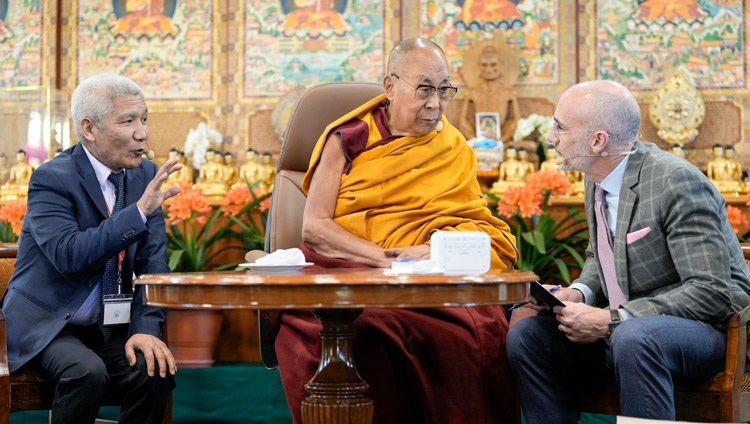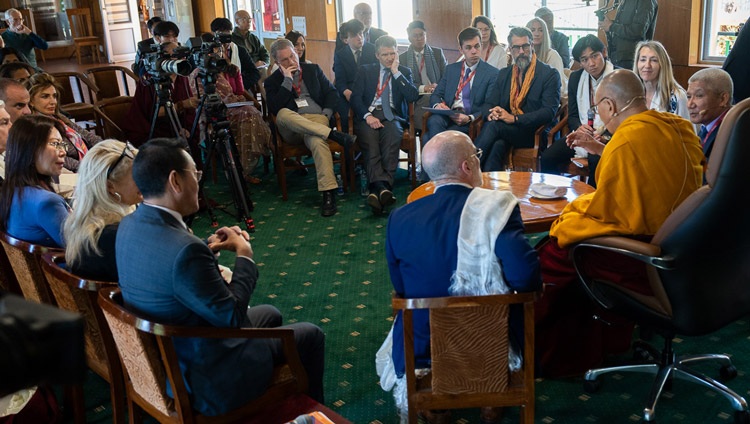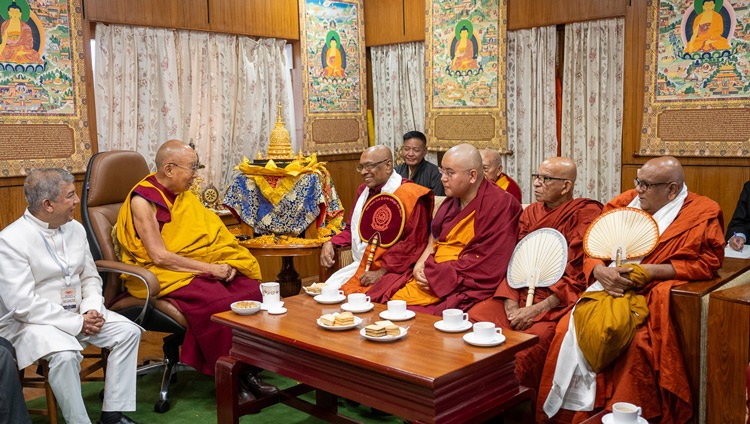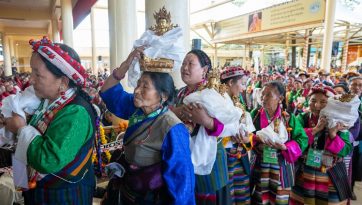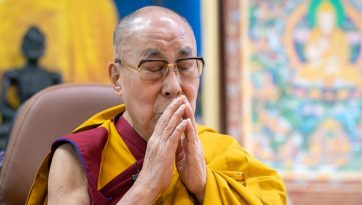The 24th Sarvepalli Radhakrishnan Memorial Lecture
November 21, 2019
New Delhi, India – This morning His Holiness the Dalai Lama drove across New Delhi to the India International Centre (IIC), where he had been invited by the Indian Institute of Advanced Study (IIAS) to give the 24th Sarvepalli Radhakrishnan Memorial Lecture. Dr Radhakrishnan was the first Vice-President of India and the second President. He founded the IIAS in 1965 in what had been the Vice-Regal Lodge and later the Rashtrapati Niwas, Shimla.
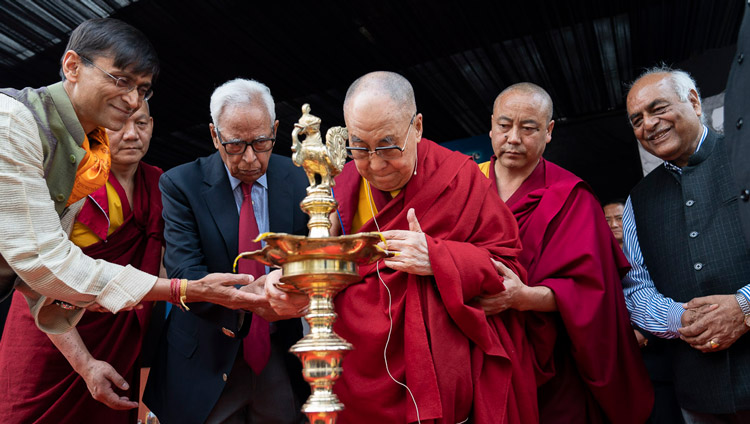
As he reached the stage erected on the IIC’s Fountain Lawn, His Holiness greeted, smiled and waved to many old friends in the 250 strong audience of invited guests. Principal among them was Dr Kapila Vatsyayan. He was requested to join Guest of Honour, Dr Vinay Sahasrabuddhe and IIAS Chairman, Kapil Kapoor in lighting a lamp to inaugurate the occasion.
Prof Makarand R Paranjape, Director of the IIAS was welcoming. He gave a potted history of the IIAS and its founding in Shimla by Dr Radhakrishnan once he had become President. The Rashtrapati Niwas was part of the Presidential estate, but was under-used. Dr Radhakrishnan, who was a scholar not only of the Vedas and Sanskrit, but also held the Spalding Chair of Ethics at Oxford, decided to transform it into an institute of advanced study. With regard to ethics he remarked, “It’s not that human beings are unaware of moral imperatives, they just don’t want to exercise them.”
Prof Paranjape invited NN Vohra, President of IIC and former Governor of Jammu & Kashmir to speak. He declared he had little to say, other than to express joy at His Holiness’s presence. He harked back to first meeting him in the early ‘60s when he was a Magistrate in Kangra and the MEA Liaison Officer was away. Mr Vohra was deputed to serve His Holiness. He recalled finding him, earnestly learning English, sitting on the veranda of his Swarag Ashram residence in Dharamsala, reading the Calcutta Statesman.
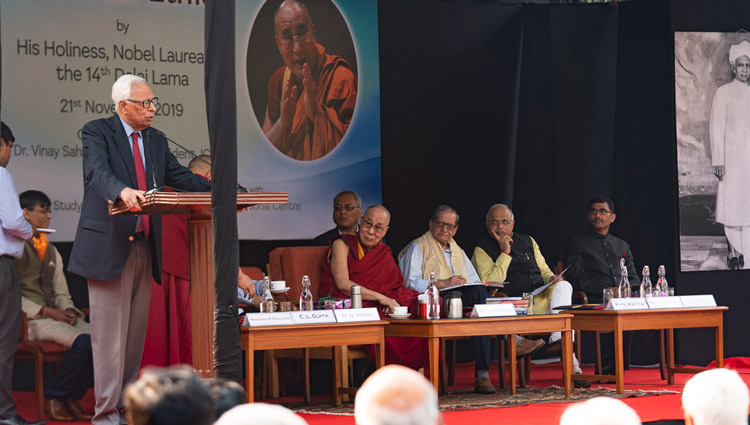
Vice-Chairman of the IIAS, CL Gupta gave a short introduction in Hindi.
Dr Vinay Sahasrabuddhe expressed his sense of honour to be sharing a platform with His Holiness. He noted that not every spiritual leader has the authority to speak about ethics, but His Holiness has earned it. He raised four points in relation to a discussion of ethics: the need for a universal acceptance of spiritual democracy; individualism and collectivism and the interdependence between them; in relation to protecting the environment and dealing with climate change, the notion that you should contribute before you consume, which he said rich, developed countries have not done. Finally, he mentioned ethics and economics, and suggested taking Mahatma Gandhi’s trusteeship as a model.
Addressing the gathering as “Respected elder brothers and sisters”, His Holiness told them he could see a number of old friends among them who he’d known for a long time.
“I recognise your faces, even if I can’t immediately remember your names. When I notice that some of you look older, I’m reminded that I’ve grown older too.
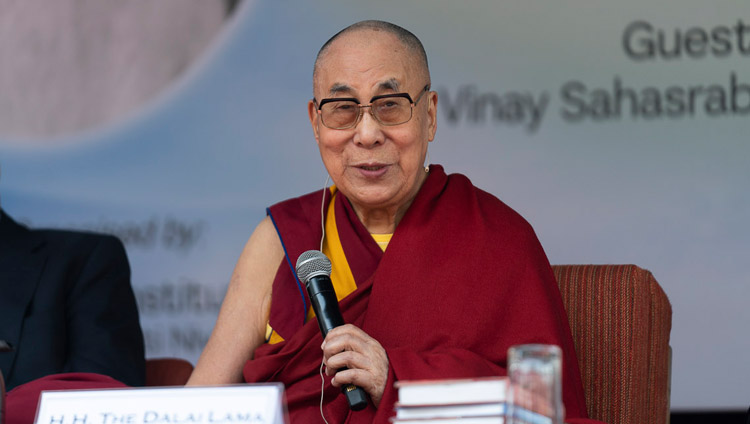
“However, what’s much more important is that we make our lives meaningful. We all have Buddha nature, but it takes practice to fulfil its potential. One of the principal factors of such practice is acquiring an understanding of reality. This entails recognising the gap between appearance and reality. Since destructive emotions are based on our misconception of appearances, the antidote to them is to recognise reality. The second factor is altruism. We can see that those who have a more compassionate outlook are happier and gather others around them.
“Today, we are commemorating Dr Radhakrishnan, who I first met when I came to India in 1956. He was the chairman of the committee that invited me to the Buddha Jayanti celebrations. He was well-versed in modern education, but also deeply learned about ancient Indian knowledge.
“The way he chanted Sanskrit was impressive, but when he declaimed verses from Nagarjuna’s ‘Mulamadhyamikakarika’ (‘Fundamental Wisdom of the Middle Way’) I reflected that understanding the meaning of the words was as important as how they sounded. Nevertheless, he embodied the positive potential of combining modern and ancient ways of learning.
“There is an urgent need for India’s traditions of ’ahimsa’ and ‘karuna’, non-violence and compassion, in today’s world, which is still riven by fighting and killing, sometimes even in the name of religion. And yet each human being fundamentally wants to live a happy life without having to grapple with suffering or a disturbed mind. In fact, we have the potential from birth to develop inner values like compassion that yield peace of mind.
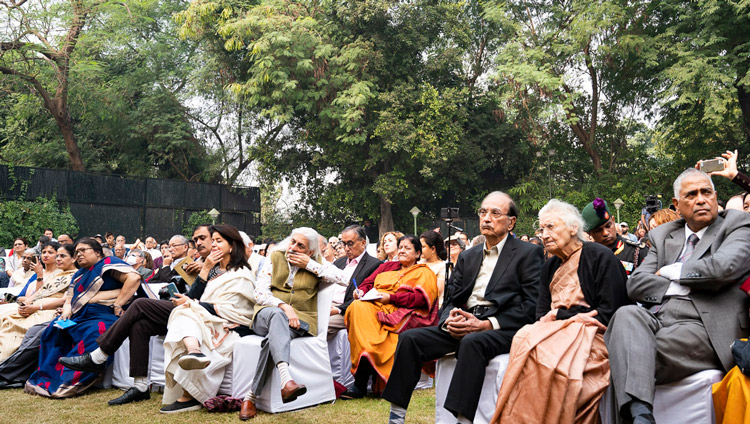
“Compassion naturally gives rise to tolerance and forgiveness. It allows us to appreciate that even someone we think of as an enemy is a human being with a right to be happy. This is one of the reasons why it’s said that your enemy can be your best teacher. He or she teaches the possibility of unconditional compassion.”
His Holiness discussed the way science is changing. At one time scientists knew a great deal about the external world, but little about the mind and our inner realm. He noted that for much of the 20th century scientists dismissed any idea that the mind was anything but a function of the brain. Since the latter years of the last century and the early years of this one, however, there has been a growing acceptance of evidence that the mind can affect the brain.
Scientists today are examining how the brain is affected in the course of meditation. There are also researchers from Moscow and Wisconsin investigating what happens when accomplished meditators enter the state of ‘thukdam’. They are clinically dead, but because their subtlest consciousness is yet to depart their bodies remain fresh for some time.
His Holiness concluded that as qualities of the mind are better understood, there is a corresponding need for schools to teach how to develop, and maintain, peace of mind. This is something to which ancient Indian knowledge can contribute.
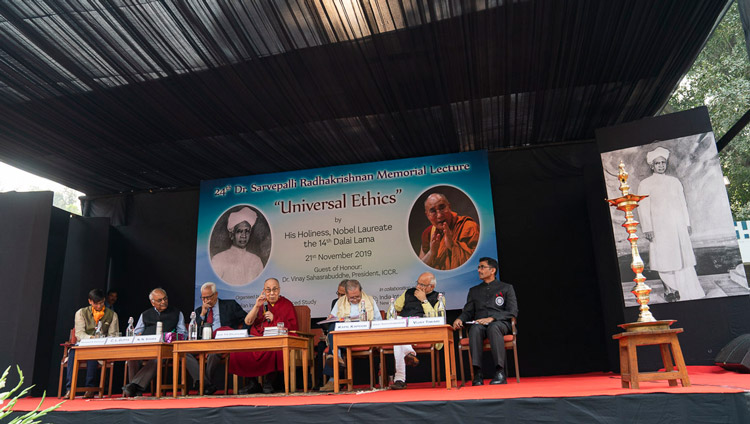
While answering questions from the audience, His Holiness spoke of the seriousness of global warming and how encouraging it is to see young people such as Greta Thunberg voicing the need to take action. He mentioned the role ‘ahimsa’ and increased vegetarianism can play.
He commented that young children naturally have a fresh, open, compassionate attitude. It should be possible for schools to nurture these qualities and teach children that warm-heartedness leads to peace of mind as well as better physical health. He remarked that if you are compassionate and altruistic everything tends to appear in a positive light. No matter what difficulties you face, you don’t lose your peace of mind. If, on the other hand, you are filled with fear and suspicion, everything appears in a negative light.
“I believe strongly in the oneness of all humanity. As human beings we are all the same,” he explained. “Therefore, whoever I meet, there’s no barrier between us.”
Asked why the teaching of Dharma seems to have declined, His Holiness suggested that perhaps too much attention is given to performing rituals and not enough to the real meaning of the teaching. He recommended giving more time to study and less to recitation. “The real practice,” he confirmed, “is to transform our mind and emotions.”
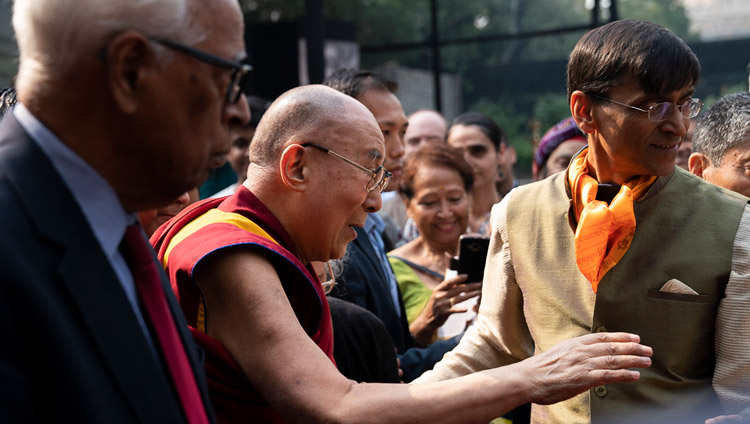
His Holiness stressed that if more time were spent in schools encouraging students to achieve peace of mind, after 30 years it would be possible to see a difference in how they turned out. Understanding how to bring about peace of mind, and tackle those negative emotions that threaten to disturb it, is the key to living a good life.
Prof Kapil Kapoor offered extensive words of thanks in Hindi and concluded that it was his pleasure and duty to thank the day’s speakers, His Holiness and Dr Vinay Sahasrabuddhe for what they had to say about ethics.
As His Holiness left the stage and made his way to the buggy that would drive him to his car, many people pressed forward in a great show of affection to greet him, shake his hand or catch his eye.
Tomorrow, he will leave Delhi for Aurangabad.

